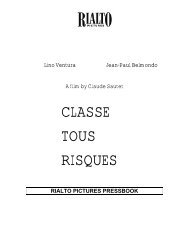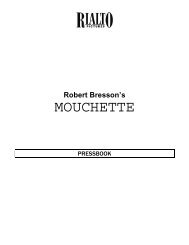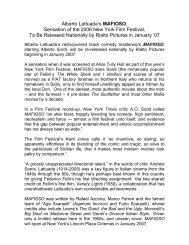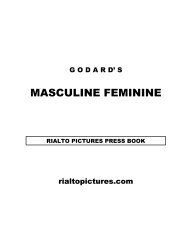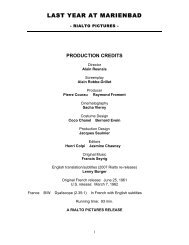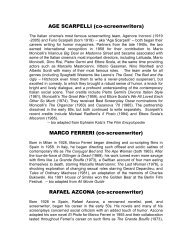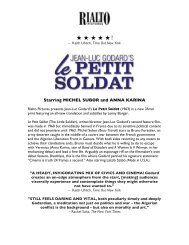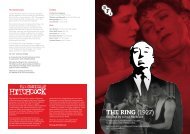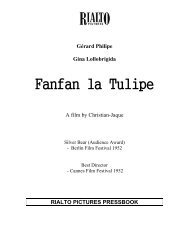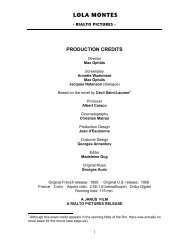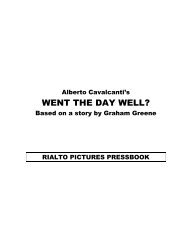download Brighton Rock pressbook - Rialto Pictures
download Brighton Rock pressbook - Rialto Pictures
download Brighton Rock pressbook - Rialto Pictures
You also want an ePaper? Increase the reach of your titles
YUMPU automatically turns print PDFs into web optimized ePapers that Google loves.
A film by John Boulting<br />
BRIGHTON ROCK<br />
RIALTO PICTURES PRESSBOOK<br />
Based on the novel by Graham Greene<br />
rialtopictures.com
BRIGHTON ROCK<br />
- RIALTO PICTURES -<br />
Director<br />
John Boulting<br />
Screenplay<br />
Graham Greene<br />
Terence Rattigan<br />
Based on the novel by<br />
Graham Greene<br />
Producer<br />
Roy Boulting<br />
Cinematography<br />
Harry Waxman<br />
Editor<br />
Peter Graham Scott<br />
Music<br />
Hans May<br />
U.K. release: December 1947<br />
U.S. release (as Young Scarface): November 7, 1951<br />
UK, 1947 running time: 92 min.<br />
aspect ratio: 1.33:1 In English<br />
A RIALTO PICTURES RELEASE<br />
rialtopictures.com<br />
2
BRIGHTON ROCK<br />
- RIALTO PICTURES -<br />
CAST<br />
Pinkie Brown<br />
Richard Attenborough<br />
Rose Brown<br />
Carol Marsh<br />
Ida Arnold<br />
Hermione Baddeley<br />
Dallow<br />
William Hartnell<br />
Prewitt<br />
Harcourt Williams<br />
Spicer<br />
Wylie Watson<br />
Cubitt<br />
Nigel Stock<br />
Judy<br />
Victoria Winter<br />
Frank<br />
Reginald Purdell<br />
Phil Corkery<br />
George Carney<br />
Colleoni<br />
Charles Goldner<br />
3
BRIGHTON ROCK<br />
- RIALTO PICTURES -<br />
SYNOPSIS<br />
Over shots of holiday-goers at <strong>Brighton</strong>, a superimposed title piously notes that<br />
“<strong>Brighton</strong> today is a large, jolly, friendly seaside town,” but acknowledges that<br />
between the wars there was “crime and violence and gang warfare” and notes<br />
“that other <strong>Brighton</strong> (is) now happily no more."<br />
A newspaper draped over a sleeping man on the beach reveals that “Kolley<br />
Kibber” will be arriving to drop off giveaway coupons, with a bonus if he is<br />
recognized. Then “Kolley Kibber” (Alan Wheatley) gets off the London train and<br />
starts dropping off his cards.<br />
Cubitt (Nigel Stock) hurtles into the gang’s house, brandishing the paper;<br />
eventually they realize that the photo of “Kibber” is Fred Hale, whose story got their<br />
previous boss Kite killed. Dallow (William Hartnell) takes the paper up to Pinkie<br />
(Richard Attenborough), their new teenage boss. Hale is nervously having a drink<br />
when he sees in a mirror Pinkie, Dallow, and Cubitt lurking behind him. Dallow<br />
indicates Hale won’t be needing that return ticket; Pinkie’s first spoken words are<br />
“Won’t anybody stop that brass’s mouth?" re the singing of a blowsy blonde in the<br />
bar. The gang stalks off after Pinkie shoves glasses off the bar. Hale tries to pick<br />
up the blonde, Ida Arnold (Hermione Baddeley), as cover, but eventually runs off<br />
alone. He realizes he’s being followed, starts running, catches a bus, but is cut off<br />
from the train station, and runs off to the pier. There he tries to pick up two other<br />
girls, but is confronted by the gang. He runs off in the crowd and runs into Ida<br />
again. They go off to the funhouse ride, but Ida must go to the ladies’, and Hale’s<br />
ride partner turns out to be Pinkie himself—who gets off the ride alone. Ida, too<br />
late, looks about for Hale.<br />
Back at their house, Pinkie realizes that there’s a loose end: Spicer (Wylie<br />
Watson), dropping off the rest of Hale’s cards, had left one at Snow’s café. Pinkie<br />
rushes off to get it back before a waitress can find it and realize that the man who<br />
left it was not the one in the photo; but Rose Brown (Carol Marsh) has already<br />
found it. Pinkie makes a date with her for later. In the bar, Ida, in a harlequin<br />
costume, is complaining about the inquest, then uses automatic writing to<br />
determine that someone forced Hale to suicide.<br />
Rose meets Pinkie at the pier, and she reveals that she’d noticed the differences<br />
between the two men. Pinkie tells her about another girl who couldn’t keep her<br />
mouth shut; later they learn they are both Catholics.<br />
Later that night, Pinkie and Dallow go off to confront Brewer (Harry Ross), who<br />
admits that he’s paid his protection money to new boss Colleoni; Pinkie slashes his<br />
cheek with a razor. Next day he’s off to a hotel to meet Colleoni (Charles Goldner)<br />
while Ida is starting her own investigation. Colleoni hints that Pinkie ought to retire<br />
or work for him but Pinkie stalks off; Ida meets Rose at Snow’s and starts to figure<br />
4
BRIGHTON ROCK<br />
- RIALTO PICTURES -<br />
things out. Rose calls the hideout to warn Pinkie, but Spicer answers. The chief<br />
copper tells Pinkie that he doesn’t want any innocent people hurt; as Pinkie leaves,<br />
Ida walks in, but the copper tells her Hale’s case is closed.<br />
On the pier, as Ida performs in a harlequin chorus, Rose tells Pinkie that Ida has<br />
been nosing about, and that she recognized the voice on the phone as the fellow<br />
who left the card, then sees a snap of Spicer himself. Pinkie tells Spicer to get out<br />
of town after the races, then calls Colleoni to get Spicer killed – but at the races the<br />
gang slashes Pinkie’s cheek. As Rose patches Pinkie up, he says Spicer is dead;<br />
she agrees not to talk. Back at the hideout, Pinkie discusses marriage with Rose<br />
with lawyer Prewitt (Harcourt Williams); they’re both underage, but a wife can’t give<br />
evidence. Spicer shows up alive, but Pinkie shoves him through a rotten banister<br />
to his death.<br />
Next day after the wedding, Pinkie records a message for Rose, starting off "you<br />
want me to say I love you" but continuing "I hate you, you little slut"—but Rose has<br />
no gramophone and can’t play it back. He tries to check them into a hotel but is<br />
turned away as Ida observes from a balcony. Pinkie takes a break from his<br />
wedding night (it’s clear he’s a virgin) to confront Cubitt, telling him that he had<br />
killed Spicer himself. Cubitt walks out.<br />
Ida confronts Prewitt and tricks him into admitting that Spicer’s death was no<br />
accident. Then she sees Rose on the morning after the wedding night and warns<br />
that her life is in danger. Pinkie comes in as Ida goes out; Dallow tells Pinkie that<br />
they’ve gotten a money offer from Colleoni if they’ll clear out and warns Pinkie to<br />
leave the girl alone. Prewitt disavows everything when Ida confronts him with the<br />
cops. Pinkie now tells Rose that they’ve got him and a suicide pact is the only way<br />
out. Pinkie, Dallow, and Rose are having a farewell drink at the bar when Ida walks<br />
in. When Pinkie and Rose walk out on the pier, Ida persuades Dallow to get the<br />
cops—Rose is in danger. Pinkie tries to get Rose to go first in the double suicide<br />
(he won’t go second, of course), but she can’t do it and throws away the gun.<br />
When Ida, Dallow, and the cops arrive, Pinkie panics and falls off the pier.<br />
In a room with a crucifix on the wall, Rose tells a nun that she should have died<br />
with Pinkie, that she wants no absolution, ever. The nun speaks of ‘the appalling<br />
strangeness of the mercy of God." To prove Pinkie loved her, Rose plays the<br />
recording; the needle sticks at "I love you."<br />
5
BRIGHTON ROCK<br />
- RIALTO PICTURES -<br />
PRODUCTION NOTES<br />
In the mid-1930s Graham Greene was a promising novelist and one of Britain’s<br />
toughest and most prominent film critics, regularly savaging the films of Alexander<br />
Korda—who partially solved that problem by hiring him as a writer in late 1936.<br />
His first screenplay for Korda, The Green Cockatoo, got him interested in the<br />
razor-wielding, homicidal race track gangs of <strong>Brighton</strong>, and he made numerous<br />
trips there (one hour from London) to absorb atmosphere—apparently just in time,<br />
for as Greene noted, "The <strong>Brighton</strong> race gangs were to all intents quashed forever<br />
as a serious menace at Lewes Assizes a little before the date of my novel." (The<br />
character “Kolley Kibber” who drops off giveaway coupons for The Daily<br />
Messenger was based on fact as well; the real News Chronicle employed a<br />
promotional character named “Lobby Ludd” who gave away £5 notes when<br />
recognized.)<br />
The book was originally intended to be a simple detective story, in line with the<br />
“entertainments” he was writing at the time, designed to be popular and, hopefully,<br />
to be sold to movie companies. The detective was to be the brassy Ida Arnold, but<br />
the character of Pinkie gradually took over (Greene: “the novel … turned around<br />
and bit me”), the whole becoming “a discussion of the distinction between goodand-evil<br />
and right-and-wrong”. All that remained of the detective story, in Greene’s<br />
view, were the first 50 pages.<br />
It was published in 1938 and did well critically and late in the year had sold 6,000<br />
copies, not a bestseller, but as Greene noted, “good for me.” It of course has<br />
remained in print ever since (the Penguin paperback is easily available in most<br />
bookstores).<br />
<strong>Brighton</strong> <strong>Rock</strong> was adapted as a play by Frank Harvey and produced by Bill Linnit<br />
at Oxford in 1943, while Greene was in Africa; when he returned to England and<br />
saw it, he was appalled. While he admired Richard Attenborough’s stage<br />
performance as Pinkie, he detested Hermione Baddeley’s Ida (“a very bad piece of<br />
miscasting”) and demanded that a number of new lines added to her part be cut;<br />
he was also enraged by the complete deletion of the final scene, the epilogue with<br />
Rose with the line “the appalling strangeness of the mercy of God,” – the omission,<br />
he felt, made the play pointless. Although these changes were made, Greene was<br />
never happy with the play, though he cashed his royalty checks and got free<br />
passes for his relatives.<br />
After the war, the filmmaking Boulting Brothers, Roy and John, returned to civilian<br />
life and fiction films with Fame is the Spur, released in 1947, but such is the lead<br />
time in film production that distinguished playwright Terence Rattigan, a previous<br />
screenplay collaborator with the Boultings, had finished an outline treatment of<br />
<strong>Brighton</strong> <strong>Rock</strong> by the summer of 1946. Greene’s first reaction was that “it provides<br />
a good skeleton to work on,” but noted that Pinkie should be firmly established as<br />
6
BRIGHTON ROCK<br />
- RIALTO PICTURES -<br />
the central character and Ida deemphasized, and the phrase “the appalling<br />
strangeness of the mercy of God” should be reinserted, along with the explanation<br />
of the title, a reference to the local hard candy. Greene liked Rattigan’s idea of<br />
placing Hale’s murder on the Fun Fair train (in the book he is apparently killed in a<br />
booth underneath the pier). According to some reports, Rattigan’s version had a<br />
happy ending, but Greene does not mention that in his critique.<br />
But eventually Greene became dissatisfied with the screenplay altogether and<br />
rewrote it himself—he and Rattigan never worked together. He retained Rattigan’s<br />
Fun Train location for the murder, added a revue number for Hermione Baddeley,<br />
despite his dislike of her stage performance, but himself soft-peddled his chilling<br />
ending. There was reportedly censorship pressure; but Greene also thought that<br />
his resolution "was a bit strong for an audience".<br />
In the book’s conclusion, Rose is going home to listen to Pinkie’s virulent<br />
recording: "She walked rapidly in the thin June sunlight towards the worst horror of<br />
all." In the film version, a crack makes the record stick at and repeat “I love you.”<br />
Greene covered himself by noting, "Anybody who had any sense would know that<br />
the next time Rose would probably push the needle over the scratch and get the<br />
full message"—but that’s not the first thing you think of when you see the film.<br />
All the day exteriors were shot on the actual locations in <strong>Brighton</strong>, presumably with<br />
hidden cameras, as there are large vista scenes with staged action in the<br />
foreground and large crowds in the background, with no one looking in the<br />
camera—some of which would have been shot from the back of a moving car. All<br />
actual locations...except for the scenes at the racecourse. The <strong>Brighton</strong> Borough<br />
Council nixed its use because the razor-slashing scene slated for that location<br />
wouldn’t do much for the town’s image (the other scenes of violence are indoors or<br />
on studio sets for night scenes). Their objections also account for the pious<br />
disclaimer at the beginning of the film—although it is in fact true.<br />
Richard Attenborough and Hermione Baddeley repeated their roles from the stage<br />
version – as noted, Greene apparently made no objection to Baddeley despite his<br />
dislike of her theater performance. The difficult part of Rose was cast in vintage<br />
Hollywood style: 21-year-old Carol Marsh (née Norma Simpson) was selected from<br />
the 2,000 actresses who auditioned for the part. While this was her first film, she<br />
was in fact already under contract by the Rank Organisation after winning an open<br />
competition for a dramatic scholarship to the Royal Academy of Music and had<br />
already adopted her stage name. Despite her striking performance, she would<br />
have only a sporadic career in film and television.<br />
The film was well received critically and made money at the box office, if it did not<br />
create a major stir at the time, but in December of the year of its release it got the<br />
ultimate compliment: in a letter to John Boulting, Greene wrote “how delighted I<br />
7
BRIGHTON ROCK<br />
- RIALTO PICTURES -<br />
was with the production. I think this is the first time I have seen one of my own<br />
books on the screen with any real pleasure.”<br />
JOHN BOULTING (Director)<br />
ROY BOULTING (Producer)<br />
Born in Bray, England, November 21, 1913; twins, they topped the Coen Brothers<br />
among filmmakers, by being identical. (One photo serves for both in a standard<br />
film history). At the age of 7 or 8, their nanny took them to see Rudolph Valentino<br />
in The Four Horsemen of the Apocalypse four times in the same week and they<br />
were hooked for life.<br />
After beginning at the bottom of the film business in the early 30s -- Roy in<br />
Canada, John taking a break to drive an ambulance for the Republic during the<br />
Spanish Civil War -- they formed their production company, Charter Film<br />
Productions, in 1937, turning out above-average “quota quickies” until the<br />
ambitious Pastor Hall (1940), a fictionalized account of anti-Nazi pastor Martin<br />
Niemoller -- the first British film to depict the German prison camps.<br />
Inducted – Roy to tanks, John to the RAF – they were temporarily released to<br />
make Thunder <strong>Rock</strong> with Michael Redgrave, from the Robert Ardrey play, and in<br />
uniform made the compilation documentaries Desert Victory, Tunisian Victory,<br />
Burma Victory.<br />
Their first postwar film, produced by John, directed by Roy – from here they would<br />
alternate jobs from picture to picture – was Fame is the Spur, starring Michael<br />
Redgrave and written by Nigel Balchin, a fictionalized account of Prime Minister<br />
Ramsay MacDonald’s rise to power. Richard Attenborough played teenagers in<br />
their next two films, as the razor-wielding Pinkie in <strong>Brighton</strong> <strong>Rock</strong>, and as a<br />
working class boy trying to fit in at a public school in The Guinea Pig. The next two<br />
were high level political thrillers, the suspenseful Oscar-winning Seven Days to<br />
Noon (nuclear blackmail in a deserted London) and High Treason (a plot to destroy<br />
the economy by blowing up power stations).<br />
For the next five years, they eschewed political and social issues in a series of<br />
inconsequential films; then in 1955, after an already lengthy career of (mostly)<br />
serious films, they began the series of satiric comedies for which they are best<br />
known, establishing almost double-handed the distinctive genre ‘British Comedy of<br />
the ‘50s’ and making stars of Ian Carmichael, Peter Sellers, and Terry-Thomas,<br />
among a regular stock company of actors: Private’s Progress on army life, with a<br />
hero stealing the art treasures he himself has rescued; Brothers in Law on lawyers<br />
-- a big success; Lucky Jim on university life, from the Kingsley Amis novel;<br />
Carleton-Browne of the F.O. on diplomacy; and then their most controversial film,<br />
I’m All Right, Jack (1959), savaging both management and the workers, with Peter<br />
Sellers winning a British Academy Award for his portrayal of a fanatical shop<br />
8
BRIGHTON ROCK<br />
- RIALTO PICTURES -<br />
steward. (As late as 1979 it was denied TV showing for fear it would damage<br />
Labour’s chances in the coming election.) After a straightforward farce and a slight<br />
thriller they gave organized religion the works in Heavens Above with Peter Sellers<br />
as a too literal vicar; and everybody but especially the upper classes in Rotten to<br />
the Core (1965).<br />
That was John Boulting’s last film as a director, though he continued to produce<br />
his brother Roy’s films, becoming managing director of British Lion. Roy filmed<br />
solo, directing Hayley Mills in the domestic comedy The Family Way in 1966 and<br />
marrying her, despite the 33 year difference in their ages, in 1971. (He married five<br />
times.) They divorced in 1976, and Roy filmed sporadically until 1985, the year of<br />
John’s death. Roy died in 2001.<br />
GRAHAM GREENE (Author/Screenwriter)<br />
Born Henry Graham Greene on October 2, 1904 in Berkhamsted, Hertfordshire,<br />
England, Greene was often referred to as the greatest living writer of the English<br />
language. His first novel, The Man Within (1929), established a tone, which would<br />
be followed by his many later works: of moral ambiguity, religious confusion and a<br />
romantic protagonist who remains emotionally detached from those around him.<br />
Later in his career, Greene became outspoken in matters of politics and frequently<br />
journeyed to countries on the verge of social upheaval. In each case, he wrote<br />
novels set within the volatile atmosphere of places no serious writers, and very few<br />
journalists, would dare venture in such stages of political uncertainty: Vietnam<br />
(The Quiet Man), Mexico (The Power and the Glory), Cuba (Our Man in Havana),<br />
the Belgian Congo (A Burnt-Out Case), Haiti (The Comedians). Even when<br />
dealing with weighty issues such as apartheid (The Human Factor) and the<br />
complexities of Catholic guilt (The Heart of the Matter), Greene's prose was never<br />
didactic or dry.<br />
Throughout his career, Greene blurred the line between lowbrow popular literature<br />
and highbrow novels with works that assumed the form of crime fiction yet<br />
possessed an emotional depth and literary craftsmanship uncommon to the genre.<br />
His frequent use of visual metaphors and his ability to structure a tight,<br />
suspenseful plot have inspired many critics to characterize Greene's style as<br />
"cinematic." While most of his novels have been adapted to the screen, very few<br />
films have succeeded in capturing the spirit of his works. Without doubt, the two<br />
most highly regarded adaptations are those made in collaboration with Carol Reed<br />
and Alexander Korda: The Fallen Idol and The Third Man 1 .<br />
The cinematic qualities of Greene's work were no doubt influenced by his own<br />
1 Both films have been re-released by <strong>Rialto</strong> <strong>Pictures</strong>.<br />
9
BRIGHTON ROCK<br />
- RIALTO PICTURES -<br />
exposure to film. From 1935 to 1940, he was film critic for The Spectator, where<br />
he championed the English cinema and often disparaged the more popular<br />
American movies then flooding the British marketplace. A review of John Ford's<br />
Wee Willie Winkie, in which he speculated about the sexual effect of Shirley<br />
Temple upon her middle-aged male fans, sparked a lawsuit, which contributed to<br />
the early demise of the magazine in which it was published (British libel laws have<br />
prevented it from being re-published in Greene anthologies to this day).<br />
In addition to writing the screenplays for The Fallen Idol and The Third Man,<br />
Greene scripted several other films based on his own work (including Our Man in<br />
Havana, directed by Reed, and The Comedians) and contributed stories and<br />
screenwriting to various other projects (21 Days, The Green Cockatoo, Went the<br />
Day Well? and Saint Joan). Several Greene novels were adapted by Hollywood,<br />
including A Gun for Hire, which became the film noir classic This Gun for Hire, and<br />
Ministry of Fear, which became a thriller directed by Fritz Lang.<br />
Greene appeared briefly on-screen in Truffaut's Day for Night, as a British<br />
insurance man. He died in 1991.<br />
TERENCE RATTIGAN (Co-Screenwriter)<br />
Born 1911 in London, and educated at Harrow and Trinity College, Oxford. He<br />
was successful from practically the beginning of his career, with his second play,<br />
French Without Tears (1936; filmed by Anthony Asquith in 1940), becoming a longrunning<br />
smash hit and working on his first screenplay the same year. After the war<br />
the hits just kept coming: The Winslow Boy (1946), The Browning Version (1948),<br />
Adventure Story – with Paul Scofield as Alexander the Great, The Deep Blue Sea<br />
(1952), The Sleeping Prince (1953—later filmed by Laurence Olivier as The Prince<br />
and the Showgirl, with Marilyn Monroe), Separate Tables (1954), and Ross (1960),<br />
with Alec Guinness as Lawrence of Arabia.<br />
But by now, in the wake of the Angry Young Man school, he was viewed as passé,<br />
to which he responded with some bitterness.<br />
He battled leukemia throughout the 60s, moved to Bermuda, cashed in on original<br />
screenplays including The V.I.P.s and The Yellow Rolls-Royce, was knighted in<br />
the early 70s, and experienced a mild revival before his death from bone cancer in<br />
1977.<br />
Since the 90s his work has had major, successful revivals on the London stage, all<br />
his major plays have been filmed over the years—some multiple times and via<br />
translation in multiple languages—and he is coming to be reevaluated as one of<br />
the major playwrights of the 20th century.<br />
10
BRIGHTON ROCK<br />
- RIALTO PICTURES -<br />
(Lord) RICHARD ATTENBOROUGH (Pinkie Brown)<br />
Born 1923 in Cambridge, son of a university don; his younger brother is nature<br />
filmmaker Sir David Attenborough. Despite lacking matinee idol looks and great<br />
magnetism, he had a meteoric rise. After attending the Royal Academy of<br />
Dramatic Art, he made his professional stage debut at 18 and his screen debut in<br />
1942 in David Lean’s In Which We Serve, as a deserter, thus beginning his<br />
typecasting in the 40s as a rat or coward, notably in London Belongs to Me,<br />
<strong>Brighton</strong> <strong>Rock</strong>, and Morning Departure.<br />
He had previously appeared on stage in <strong>Brighton</strong> <strong>Rock</strong> in 1943 at 20, and in 1952<br />
appeared in the premiere of Agatha Christie’s The Mousetrap – which continues its<br />
West End run to this day. He had married his co-star, Sheila Sim, in 1945; they’ve<br />
lived in the same house in Richmond Green since 1951.<br />
He escaped typecasting in the 50s and worked prolifically, notably in comedies for<br />
the Boulting Brothers: Private’s Progress and I’m All Right Jack. But wanting to<br />
take full control of his career, he joined with writer/director Bryan Forbes to form<br />
Beaver Films, beginning with a bang with The Angry Silence, with Attenborough<br />
producing as well as starring, as a worker who refuses to join a wildcat strike; the<br />
resulting furor, with praise from Tories and impassioned criticism from many<br />
socialists and union members, guaranteed box office success. Their next, the<br />
witty, all-star caper movie The League of Gentleman, did even better, with<br />
Attenborough again producing and starring. While producing critical and<br />
commercial hits like The L-Shaped Room and Whistle Down the Wind, his acting<br />
career really took off in the 60s, playing “Big X” in The Great Escape opposite<br />
James Garner and Steve McQueen; winning a British Academy Award for both<br />
Séance on a Wet Afternoon—as the kidnapping, Milquetoast husband of supposed<br />
psychic Kim Stanley—and, although basically miscast, as the gruff Sergeant Major<br />
in Guns at Batasi; joining an all-star cast led by James Stewart in The Flight of the<br />
Phoenix; playing Steve McQueen’s nice guy pal in the epic The Sand<br />
Pebbles—but by then he was already looking to direct. Since then, he has acted<br />
sporadically, as the most mild-mannered of serial killers in 10 Rillington Place;<br />
socking John Wayne in Brannigan; for Indian great Satyajit Ray in The Chess<br />
Players; as the zillionaire impresario of Jurassic Park; and as Kris Kringle in the<br />
remake of Miracle on 34 th Street.<br />
He began directing in 1969 with an adaptation of the smash musical set in World<br />
War I Oh! What a Lovely War and followed with two (mostly) British historical<br />
epics, Young Winston, on Churchill’s early life and adventures, and A Bridge Too<br />
Far, an all-star recreation of the parachute drop battle at Arnhem, Holland. After<br />
the basically two character Stephen King adaptation Magic, he won multiple<br />
awards worldwide for the epic biography of Gandhi, including Oscars for Best<br />
Picture, Director, and Actor (Ben Kingsley). An adaptation of the long-running<br />
11
BRIGHTON ROCK<br />
- RIALTO PICTURES -<br />
musical A Chorus Line was not a success, but his next three films all garnered<br />
Oscar nominations: for Denzel Washington as South African freedom fighter<br />
Steven Biko in Cry Freedom; Robert Downey, Jr. as Chaplin; and Debra Winger as<br />
the American wife of C.S. Lewis in Shadowlands. His succeeding films have not<br />
been that well received or distributed. He made his latest film, Closing the Ring,<br />
in 2007, when he was 84.<br />
In civic life, he has been Chancellor of the University of Sussex, a director of the<br />
Chelsea Football Club, Chairman of the Board of Governors of the British Film<br />
Institute, Chairman of Channel Four, President of RADA, President of BAFTA, etc.<br />
In 1984, his daughter, her mother-in-law, and his granddaughter, were killed by the<br />
Indian Ocean tsunami.<br />
In 1967, he was made a Commander of the Order of the British Empire (CBE),<br />
knighted as Sir Richard in 1976 and in 1993 made a life peer as Baron<br />
Attenborough, making him with Laurence Olivier the only actors to be ennobled.<br />
HERMIONE BADDELEY (Ida Arnold)<br />
Born 1906 in Shropshire, England; and despite her Cockney screen persona,<br />
moved in high social circles (an ancestor was a British general in the American<br />
Revolution, and her first husband boasted descent from William the Conqueror).<br />
Her elder sister Angela starred in Upstairs, Downstairs.<br />
First film 1927, but she was mainly a stage actress until immediately after the war<br />
she became a regular supporting player in well-known films: It Always Rains on<br />
Sunday 2 , <strong>Brighton</strong> <strong>Rock</strong> (as the female lead, her largest screen part), the Ealing<br />
classic Passport to Pimlico, Scrooge (as Mrs. Cratchit), The Pickwick Papers,<br />
The Belles of St. Trinian's, and Mary Poppins.<br />
Despite the 22 year age difference, she had a long relationship with Laurence<br />
Harvey (“After you've lived with Laurence Harvey, nothing in life is ever really too<br />
awful again”), appearing with him in Expresso Bongo and Room at the Top; for<br />
the latter she was Oscar nominated for Best Supporting Actress, at less than<br />
three minutes screen time, the shortest performance ever to get a nomination.<br />
Baddeley’s first U.S. appearance came when she replaced Angela Lansbury in A<br />
Taste of Honey on Broadway. In 1963 she was Tony nominated for Tennessee<br />
Williams’ The Milk Train Doesn't Stop Here Anymore. She later became<br />
omnipresent on U.S. TV, appearing 36 times as the bawdy housekeeper on<br />
Maude. She died of a stroke in 1986.<br />
2 Re-released by <strong>Rialto</strong> <strong>Pictures</strong> in 2008.<br />
12
BRIGHTON ROCK<br />
- RIALTO PICTURES -<br />
WILLIAM HARTNELL (Dallow)<br />
Born 1908 in London out of wedlock, a fact he carefully concealed; he never<br />
knew his father’s identity, despite strenuous efforts to find him. Began in the<br />
theater in 1925 as a general stagehand and eventually became a specialist in<br />
farce in repertory performances pre-war; he also began in 1932 playing small film<br />
parts.<br />
Invalided out of the Royal Armoured Corps in the war due to a nervous<br />
breakdown, then following his Sergeant in Carol Reed’s The Way Ahead, began<br />
playing tough guys: the bartender in Odd Man Out, “Dallow” in <strong>Brighton</strong> <strong>Rock</strong>,<br />
and “Dad,” the football scout in This Sporting Life, and many others. Some critics<br />
compared his earlier screen persona to James Cagney’s.<br />
In 1963, he created the title role in Doctor Who, the role for which he is best<br />
remembered, and continued until he reluctantly left the series three years later.<br />
Hartnell admitted that he took the part as a change of pace from the gruff parts in<br />
which he been typecast, and particularly enjoyed becoming the idol of children.<br />
His regular fluffing of lines in the part has been variously attributed to deliberate<br />
choice in the characterization or as memory loss stemming from the onset of<br />
arteriosclerosis. He died in Kent in 1975.<br />
RIALTO PICTURES<br />
Described as “the gold standard of reissue distributors” by Los Angeles<br />
Times/NPR film critic Kenneth Turan, <strong>Rialto</strong> <strong>Pictures</strong> was founded in 1997 by<br />
Bruce Goldstein. A year later, Adrienne Halpern joined him as partner. In 2002,<br />
Eric Di Bernardo became the company’s National Sales Director.<br />
<strong>Rialto</strong>’s past releases have included Renoir’s Grand Illusion; Carol Reed’s The<br />
Third Man; Fellini’s Nights of Cabiria; Jules Dassin’s Rififi; De Sica’s Umberto D;<br />
Godard’s Contempt, Band of Outsiders, Masculine Feminine and A Woman is a<br />
Woman; Julien Duvivier’s Pépé le Moko; Buñuel’s Discreet Charm of the<br />
Bourgeoisie, Diary of a Chambermaid, The Phantom of Liberty, The Milky Way and<br />
That Obscure Object of Desire; John Schlesinger’s Billy Liar; Clouzot’s Quai des<br />
Orfèvres; Mike Nichols’ The Graduate; The Maysles’ Grey Gardens; Mel Brooks’<br />
The Producers; Jacques Becker’s Touchez Pas Au Grisbi; Bresson’s Au Hasard<br />
Balthazar; Franju’s Eyes Without A Face; and Jean-Pierre Melville’s Bob le<br />
Flambeur and Le Cercle Rouge, for the first time in its uncut European version.<br />
In 2002, the company released the critically acclaimed first-run film Murderous<br />
Maids, the chilling true story of two homicidal sisters, starring Sylvie Testud.<br />
13
BRIGHTON ROCK<br />
- RIALTO PICTURES -<br />
<strong>Rialto</strong> celebrated a record-breaking 2004 with the previously unreleased, original<br />
1954 Japanese version of Godzilla and Gillo Pontecorvo’s groundbreaking The<br />
Battle of Algiers, which became one of the year’s top-grossing foreign films.<br />
In 2006, <strong>Rialto</strong> released Melville’s 1969 epic masterpiece Army of Shadows for the<br />
very first time in the U.S. Army of Shadows became the most critically acclaimed<br />
film of the year, topping many Ten Best lists, including those in The New York<br />
Times and Premiere, and was named Best Foreign Film of 2006 by the New York<br />
Film Critics’ Circle, in addition to receiving special awards from both the Los<br />
Angeles and National Society of Film Critics.<br />
<strong>Rialto</strong>’s re-release of Alberto Lattuada’s Mafioso, a dark comedy starring Alberto<br />
Sordi, was the unqualified highlight of the 2006 New York Film Festival.<br />
2007 re-releases included Melville's Le Doulos, starring Jean-Paul Belmondo, and<br />
Jean-Jacques Beineix's "second wave" thriller Diva.<br />
In 2008, the company had phenomenal success with Alain Resnais's 1962<br />
arthouse classic Last Year at Marienbad. <strong>Rialto</strong> also released Robert Hamer's<br />
rediscovered masterwork of “Brit Noir,” It Always Rains on Sunday, and undertook<br />
their second hit reissue of Godard's Contempt. Another successful re-release was<br />
Max Ophüls' legendary film Lola Montès in a definitive new 35mm restoration,<br />
which was showcased to enormous acclaim at the Cannes and Telluride Film<br />
Festivals and was the spotlight retrospective of the 2008 New York Film Festival.<br />
<strong>Rialto</strong>’s most recent releases have been the U.S. premiere of Godard’s Made in<br />
U.S.A, the 40th anniversary re-release of Costa-Gavras’ Academy Award- winning<br />
political thriller Z, starring Yves Montand and Jean-Louis Trintignant, and Jean-<br />
Pierre Melville’s legendary wartime drama Léon Morin, Priest, starring Jean-Paul<br />
Belmondo.<br />
In 1999, <strong>Rialto</strong> received a special Heritage Award from the National Society of Film<br />
Critics, and in 2000 received a special award from the New York Film Critic’s<br />
Circle, presented to Goldstein and Halpern by Jeanne Moreau. The two copresidents<br />
have each received the French Order of Chevalier of Arts and Letters.<br />
2007 marked <strong>Rialto</strong>’s tenth anniversary, a milestone that was celebrated with a<br />
retrospective at the Museum of Modern Art in New York. Similar tributes were held<br />
at George Eastman House in Rochester, New York; the AFI Silver Theater in<br />
Washington, D.C.; and the SIFF Theater in Seattle.<br />
In honor of the company’s anniversary, The Criterion Collection issued a special<br />
gift box set, 10 Years of <strong>Rialto</strong> <strong>Pictures</strong>, containing ten films displaying the breadth<br />
of <strong>Rialto</strong>’s collection, including Army of Shadows, Au Hasard Balthazar, Band of<br />
Outsiders, Billy Liar, The Discreet Charm of the Bourgeoisie, Mafioso, Murderous<br />
14
BRIGHTON ROCK<br />
- RIALTO PICTURES -<br />
Maids, Rififi, The Third Man, and Touchez pas au Grisbi.<br />
In May 2009, the San Francisco International Film Festival presented Goldstein<br />
with its prestigious Mel Novikoff Award.<br />
RIALTO PICTURES RELEASES<br />
2009 MADE IN USA (U.S. premiere)<br />
Z<br />
LEON MORIN, PRIEST<br />
BRIGHTON ROCK<br />
2008 LAST YEAR AT MARIENBAD<br />
IT ALWAYS RAINS ON SUNDAY<br />
CONTEMPT<br />
LOLA MONTES<br />
2007 MAFIOSO<br />
LE DOULOS<br />
DIVA<br />
2006 ARMY OF SHADOWS<br />
THE FALLEN IDOL<br />
FANFAN LA TULIPE<br />
TWO OR THREE THINGS I KNOW ABOUT HER<br />
2005 MASCULINE FEMININE<br />
ELEVATOR TO THE GALLOWS<br />
THE TWO OF US<br />
CLASSE TOUS RISQUES<br />
MOUCHETTE<br />
2004 THE BATTLE OF ALGIERS<br />
GODZILLA (U.S. premiere of uncut Japanese version)<br />
HEARTS AND MINDS<br />
2003 LE CERCLE ROUGE (U.S. premiere of uncut version)<br />
A WOMAN IS A WOMAN<br />
TOUCHEZ PAS AU GRISBI<br />
AU HASARD BALTHAZAR<br />
EYES WITHOUT A FACE<br />
THE MILKY WAY<br />
2002 PEPE LE MOKO<br />
15
BRIGHTON ROCK<br />
- RIALTO PICTURES -<br />
MURDEROUS MAIDS<br />
QUAI DES ORFEVRES<br />
UMBERTO D.<br />
THE PRODUCERS<br />
THE PHANTOM OF LIBERTY<br />
2001 BAND OF OUTSIDERS<br />
BOB LE FLAMBEUR<br />
THAT OBSCURE OBJECT OF DESIRE<br />
JULIET OF THE SPIRITS<br />
2000 RIFIFI<br />
THE DISCREET CHARM OF THE BOURGEOISIE<br />
DIARY OF A CHAMBERMAID<br />
BILLY LIAR<br />
1999 THE THIRD MAN<br />
GRAND ILLUSION<br />
PEEPING TOM<br />
1998 NIGHTS OF CABIRIA<br />
GREY GARDENS<br />
1997 CONTEMPT<br />
THE GRADUATE<br />
Pressbook written by Michael Jeck<br />
Edited by Bruce Goldstein & Adrienne Halpern<br />
© 2009, <strong>Rialto</strong> <strong>Pictures</strong> LLC<br />
“TEN YEARS OF RIALTO PICTURES”<br />
DVD BOX SET RELEASED BY CRITERION<br />
In honor of the company’s anniversary, The Criterion Collection has issued a<br />
special gift box set containing ten films displaying the breadth of <strong>Rialto</strong>ʼs collection,<br />
including Army of Shadows, Au Hasard Balthazar, Band of Outsiders, Billy Liar,<br />
Discreet Charm of the Bourgeoisie, Mafioso, Murderous Maids, Rififi, The Third<br />
Man, and Touchez pas au Grisbi.<br />
Press contact (<strong>Rialto</strong> box set only): Brian Carmody, (212) 685-4144<br />
16



